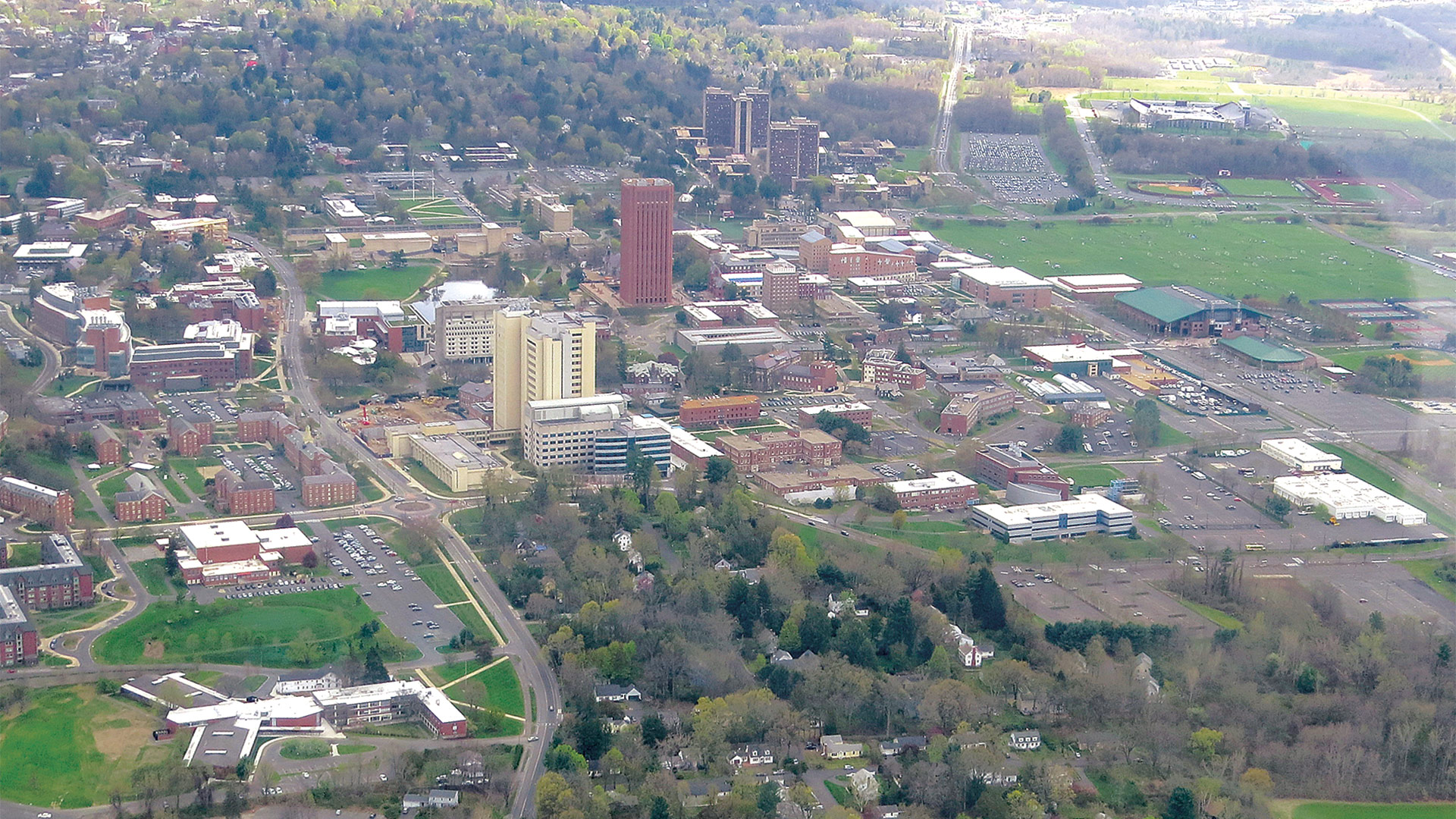Life in Limbo
 It was becoming clear weeks ago that the novel coronavirus would have some sort of economic impact once it washed ashore in the U.S. — but it’s still not clear, and perhaps won’t be for some time, how severe and wide-ranging the damage could be, as people cancel travel plans, curtail business operations, shut down college campuses, and take any number of other actions to stay safe. It’s a fast-moving story, and one that’s only beginning.
It was becoming clear weeks ago that the novel coronavirus would have some sort of economic impact once it washed ashore in the U.S. — but it’s still not clear, and perhaps won’t be for some time, how severe and wide-ranging the damage could be, as people cancel travel plans, curtail business operations, shut down college campuses, and take any number of other actions to stay safe. It’s a fast-moving story, and one that’s only beginning.
The first confirmed cases of the novel coronavirus had barely shown up in the U.S. when some of Bob Nakosteen’s students in an online graduate economics course started dropping the course because they were dealing with a more immediate issue: supply-chain interruptions in their own companies.
“These companies have supply chains that stretch into China, and, well … the word ‘disruptive’ doesn’t even capture it,” Nakosteen said. “Those chains have been completely severed. These people are absolutely in crisis mode.
“A situation like this interacts with the ethic of lean production,” he went on. “People keep limited inventories — and that’s great as long as there’s a supply chain that’s frictionless and reliable. As soon as you get a disruption in the supply chain, which could happen because of a strike, because of a virus, for any number of reasons, there’s no inventory buffer. It doesn’t cause delayed difficulty to the firm; it causes an immediate one. And that’s what you’ve got now.”
Editor’s Note:
The coronavirus pandemic is impacting this region and its business community in ways that are far-reaching and unprecedented. Visit COVID-19 News & Updates and opt into BusinessWest Daily News to stay informed with daily updates.
More than a week has passed since we spoke with Nakosteen — a professor and chair of the Department of Operations and Information Management at Isenberg School of Management at UMass Amherst — for this story, meaning another week for the supply-chain situation for manufacturers and other companies to deteriorate.
In fact, when it comes to the economic impact of the virus that causes the respiratory illness known as COVID-19, now officially a pandemic, virtually everything has only gotten worse.
“We have to assume everything will be affected. Airlines are experiencing reduced demand, cancelling hundreds and thousands of flights,” he said, noting that reduced tourism will hit numerous sectors, from hotels and restaurants to ground transportation and convention halls, that rely on travelers.
“How many firms are curtailing business travel? The NCAA now plans to play playing games with empty stands,” he went on, a decision that became official soon after — not to mention the NBA suspending its season outright. “What happens to the people who provide parking and concessions? Now multiply that over hundreds or thousands of events that are scheduled to take place over the next couple of months. It’s going to have an economic effect.”

UMass Amherst is one of several area colleges and universities that are sending students home and will conduct remote classes only for the time being.
Nakosteen’s own campus is certainly feeling that impact. The day before BusinessWest went to press, the five campuses in the UMass system suspended in-person instruction and will transition to online course delivery, at least through early April and perhaps beyond. That followed a similar move by Amherst College, whose president, Carolyn Martin, told students the college was taking to heart the announcement by Dr. Anthony Fauci, director of the National Institute of Allergy and Infectious Diseases, that the U.S. is past the point of totally containing COVID-19. Other area colleges have since followed suit, or are considering their options.
“While there continue to be no reported cases of the virus on our campus, we need to focus on mitigating its possible effects,” she said, using language that will no doubt be similar to the statements other colleges, in Massachusetts and across the U.S., are currently preparing. “We know that many people will travel widely during spring break, no matter how hard we try to discourage it. The risk of having hundreds of people return from their travels to the campus is too great. The best time to act in ways that slow the spread of the virus is now.”
While all travel is slowing — for example, the governors of Massachusetts and Connecticut have both curtailed out-of-state business travel by government employees, and President Trump issued a European travel ban — Don Anderson, owner of the Cruise Store in East Longmeadow, has seen vacation travel take a major hit.
“We’re a society where, when you’re growing up, you eat your meal, and then you get your dessert. Now we have a situation where people are not having their dessert — their vacation,” he told BusinessWest. “Imagine kids not going to the islands or not going to a park, to the annual parade, not going anywhere. We are a society that works our butts off, we put in overtime, so we can have our time off. To have a year with no time off, that’s not who we are. As Americans, we want our vacation, we want our escape, so we can recharge and come back and work our butts off again.”
But they’re increasingly calling off those vacations, even though Fauci told reporters last week that cruise ships, with all the precautions they’re taking (more on that later), are safe for healthy young people.
“These companies have supply chains that stretch into China, and, well … the word ‘disruptive’ doesn’t even capture it. Those chains have been completely severed. These people are absolutely in crisis mode.”
“The bottom line is, we are unintentionally punishing ourselves by not having an escape. A good portion of our customers are going on trips, but many are not,” Anderson said, adding that he expects the industry to recover after the crisis is over. “That’s what we’re all hoping. Otherwise, it’s a dire situation for the industry and even more so for the economies that travel impacts directly and indirectly, including the United States.”
For now, though, businesses of all kinds are in a sort of limbo, bearing the initial brunt of an economic storm spreading as quickly as coronavirus itself — no one really sure how severe it will get, and when it will turn around.
Sobering Education
Many companies, from small outfits with a few employees to regional giants, are grappling with similar questions about what to do if the virus threatens their workforce. On that upper end, size-wise, is MassMutual in Springfield, which has certainly talked strategy in recent days.
“MassMutual is taking appropriate action to protect the health of our employees, their families, and our community and assure the continuity of our business operations,” Laura Crisco, head of Media Relations and Strategic Communications, told BusinessWest. “This includes limiting non-essential domestic and international business travel and ensuring employees are prepared to work remotely, including proactively testing work-from-home capabilities.”
In the meantime, MassMutual is limiting non-essential guests at its offices, enhancing cleaning protocols at its facilities, and limiting large-scale meetings, she added. “We are continuously monitoring this evolving situation, reassessing our approach, and staying in close communication with our employees.”
Most importantly, Crisco said, anyone who is sick is encouraged to stay home, and the company is also communicating basic guidance on how to prevent the spread of germs, such as thorough hand washing, using hand sanitizer, covering coughs and sneezes, avoiding close contact with people who are sick, avoiding touching faces with unwashed hands, and frequently cleaning and disinfecting touched objects and surfaces.
Kevin Day, president of Florence Bank, told BusinessWest the institution has disaster plans in place for a host of circumstances, from epidemics to natural disasters, and has developed strategies for meeting basic customer needs in case staffing is reduced.

Bob Nakosteen
“As soon as you get a disruption in the supply chain, which could happen because of a strike, because of a virus, for any number of reasons, there’s no inventory buffer. It doesn’t cause delayed difficulty to the firm; it causes an immediate one.”
“We just checked with all our managers and asked, ‘are we comfortable that everyone is cross-trained enough, so that, if your area was out, we could function?’ Pretty much everyone said, ‘yes, we have the plans right here, we know exactly what we’d do.’
He understands, however, that no one can anticipate the extent of the crisis quite yet.
“It’s not like we haven’t seen challenges in the past. Whatever challenge is presented, we’ve just got to get the right people in the building together and think about how to continue to do what we do, which is open the door and serve the customers. We have those things in place,” Day said. “As it ramps up, and all of a sudden your employees start coming down with it, the escalation would get much greater, and you might have to take more draconian steps.”
‘Draconian’ might be a word some people used when they first heard about the college shutdowns, but there’s a logic behind that move.
“While at this time there are no confirmed cases of COVID-19 on our campus or in the surrounding community, we are taking these steps as a precautionary measure to protect the health and well-being of our students, faculty, and staff,” Kumble Subbaswamy, chancellor of UMass Amherst, said in a statement to students. “By reducing population density on campus, we will enable the social distancing that will mitigate the spread of the virus. There is presently no evidence that our campus is unsafe, but our transition to remote learning is intended to create a safer environment for all — for the students who return home and the faculty and staff who remain.”
He conceded that the move is a massive disruption for students and families, but said the university is committed to helping those with the greatest needs on an individual basis. Meanwhile, the Provost’s office is working with the deans to identify laboratory, studio, and capstone courses where face-to-face instruction is essential, and students in these courses will be notified whether they can return to campus after spring break.
At the same time, Martin said Amherst College will consider making exceptions for students who say it’s impossible to find another place to stay.
“It saddens us to be taking these measures,” she added. “It will be hard to give up, even temporarily, the close colloquy and individual attention that defines Amherst College, but our faculty and staff will make this change rewarding in its own way, and we will have acted in one another’s best interests.”
Elementary-, middle- and high schools may close as well, after Gov. Charlie Baker, as part of his emergency declaration last week, freed school districts from mandatory-days rules, so that they have the flexibility to make decisions on temporary closures due to coronavirus.
Specifically, the longest any school district will be required to go is its already-scheduled 185th day. No schools will be required to be in session after June 30. Schools may also disregard all attendance data for the remainder of the school year.
Reaction or Overreaction?
While some economic impacts may be inevitable, Anderson questioned whether some businesses are being hurt more than others based on, in his case, media spin that has focused on a couple of recent outbreaks on cruise ships.
“Honestly, I’m more concerned walking into the supermarket — that tomato I’m grabbing or fresh produce I’m purchasing, I don’t know how many people before me have touched it. I don’t know who’s touching the elevator button. I don’t know who entered their pin number on the debit/credit-card reader. Even when we voted, everyone who used the polling booth shared the same pens,” he said, adding quickly that election officials in East Longmeadow, where he is a Town Council member, did occasionally wipe down the voting surfaces and pens, as did other communities.
“What we do know is there’s been well over 20,000 deaths of American citizens from the flu this season alone, but I’m not seeing large, front-page stories about that,” Anderson noted. “Why aren’t there long lines out of the local CVS or Walgreens to get the flu vaccine?”

Dr. Robert Roose
“We are regularly in touch with the state Department of Health as well as monitoring guidance from the Centers for Disease Control. That’s important to ensure all of our activities are aligned with the latest data and resources.”
The key, he said, is a balanced and measured response — and for people to use healthy practices all the time. As one example, he noted the hand-washing stations at the entrance of all restaurants on cruise ships. While at least two cruise lines have temporarily suspended voyages, those still operating strictly follow those protocols.
“You have dedicated crew reminding everyone and watching so you wash your hands before going in,” he said. “It’s not something you see in stateside restaurants. But on cruise ships, you have to wash your hands. These washing stations were a consequence years ago of the norovirus impacting a small number of cruise-ship passengers. As a result, the incidences onboard ships has lowered.”
Meanwhile, U.S. Travel Assoc. President and CEO Roger Dow worried about bold moves like barring European travel. “Temporarily shutting off travel from Europe is going to exacerbate the already-heavy impact of coronavirus on the travel industry and the 15.7 million Americans whose jobs depend on travel,” Dow said in a statement.
While many businesses struggle with the economic impact of the novel coronavirus and the anxiety it’s causing among Americans, others see it as a chance to expand their services.
For example, the Springfield-based law firm Bulkley Richardson launched a COVID-19 response team last week comprised of attorneys in the areas of business, finance, employment, schools, healthcare, and cybersecurity. Understanding that each business will be affected differently, the firm noted that taking proactive measures may help minimize the risk of business interruptions, and the COVID-19 response team has developed — and posted on its website — a catalog of issues to be considered by each business owner or manager.
Meanwhile, Associated Industries of Massachusetts published an expansive guide to employment-law issues that might arise due to the virus, dealing with everything from quarantines and temporary shutdowns to remote work and employee privacy issues. That guide is available at aimnet.org/blog/the-employers-guide-to-covid-19. John Gannon, a partner with Skoler, Abbott & Presser, also answers some relevant questions in this issue.
Righting the ship if COVID-19 sparks an actual recession could be difficult, for a number of reasons, writes Annie Lowrey, who covers economic policy for the Atlantic. She notes several reasons why a coronavirus recession could be difficult to reverse in the short term, including its uncertainty, demand and supply shocks at the same time (that supply-chain issue again), political polarization in the U.S., the global nature of COVID-19, and the fact that monetary policy is near exhaustion, as the Federal Reserve has already cut rates to near-historic lows, leaving little room to maneuver in the coming months
“They really don’t have much space to cut,” Nakosteen added. “Normally when the economy runs into trouble, the Federal Reserve runs in to the rescue. The problem now is we don’t have much room to rescue.”
He also cited the psychological factor that can quickly turn economic anxiety into something worse. “People say, ‘oh my God,’ they start drawing in their tentacles, and that’s when you have a recession.”
Lives in the Balance
None of this is to suggest that the economic impacts of COVID-19 outweigh the human ones. This is, foremost, a health crisis, one the healthcare community, particularly hospitals, are bracing for.
“We have an emergency preparedness committee, but those policies are sort of general,” said Dr. Joanne Levin, medical director of Infection Prevention at Cooley Dickinson Hospital. “We’ve had a lot of incidents in the past decade — we’ve prepared for Ebola, measles, H1N1, a lot of things. But each epidemic is different in how it’s transmitted and what to watch for. With each epidemic, we have to go through the emergency preparation plan and figure things out.”
Dr. Robert Roose, chief medical officer at Mercy Medical Center, echoed that idea. “We have a standard infection-control committee and a plan that we would activate whenever we have a surge of infectious-disease patients,” he told BusinessWest. “This particular situation is rapidly evolving. We are regularly in touch with the state Department of Health as well as monitoring guidance from the Centers for Disease Control. That’s important to ensure all of our activities are aligned with the latest data and resources.”
Meanwhile, the state Department of Public Health (DPH) continues to offer guidance to the public at www.mass.gov/2019coronavirus. It’s also urging older adults and those with health issues to avoid large crowds and events, while individuals who live in households with vulnerable people, like elderly parents, should also consider avoiding crowds. The DPH is also issuing guidance to long-term-care facilities, where sick visitors could endanger dozens of people very quickly.
Still, coronavirus is also an economic story, one with a plot that’s only beginning to take shape. It also may be a long story, with no end in sight.
“We’re in a position where we don’t know exactly what’s going to happen, but we can speculate on what parts of the economy are going to be affected,” Nakosteen said. “We’re all watching it play out without a whole lot of idea how it will play out.”
Joseph Bednar can be reached at [email protected]








 It was becoming clear weeks ago that the novel coronavirus would have some sort of economic impact once it washed ashore in the U.S. — but it’s still not clear, and perhaps won’t be for some time, how severe and wide-ranging the damage could be, as people cancel travel plans, curtail business operations, shut down college campuses, and take any number of other actions to stay safe. It’s a fast-moving story, and one that’s only beginning.
It was becoming clear weeks ago that the novel coronavirus would have some sort of economic impact once it washed ashore in the U.S. — but it’s still not clear, and perhaps won’t be for some time, how severe and wide-ranging the damage could be, as people cancel travel plans, curtail business operations, shut down college campuses, and take any number of other actions to stay safe. It’s a fast-moving story, and one that’s only beginning.




